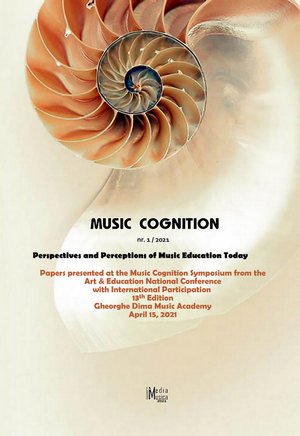NLP and Improvisation in Music Therapy - Conceptual Framework
NLP and Improvisation in Music Therapy - Conceptual Framework
Author(s): Cecilia CurisSubject(s): Fine Arts / Performing Arts, Music
Published by: MediaMusica
Keywords: improvisation; music therapy; systematized flexibility; NLP; EBP; therapeutic relationship;
Summary/Abstract: Purpose: Improvisation is a valuable technique in music therapy. However, theinclusion in the category of evidence-based scientific methods requires areconsideration of the technique in terms of clinical improvisation as well asinterpretation - improvisation evaluation, starting from the improvisation evaluationmodel.Research motivation: The analysis of the technique to establish a conceptualframework to preserve the flexibility of the technique so that it maintains its clinicallyproven efficiency and scientific validation in accordance with EBP, to expand its use inclinical practice.Research questions: Can we standardize the technique of improvisation in the sense ofestablishing protocols in its application as a technique in music therapy excluding acontradiction between these notions, standardization and improvisation?Context: The keystone of improvisation is creativity, an individual, innate trait.Improvisation in melotherapy as well as language analysis through the NLP techniqueare useful tools in psychotherapy. The current clinical practice imposes the need tostandardize and algorithmize the intervention methods, in order to frame theirapplication in the category of evidence-based scientific methods (EBP)Theoretical perspective: We combined the two intervention techniques to achieve atranslation of emotions from a non-verbal language, the musical language, into a verbalone, made through NLP in order to eliminate the dose of subjectivism that can beattributed to the interpretation of musical improvisation through the model IAP(Improvisational Assessment Profiles)Conceptual framework: The starting point of this paper is the definition developed bythe founder of the use of improvisation in music therapy, Kenneth E. Bruscia, in the book'The Fundamentals of Improvisational Music Therapy. Reformulating we arrive at thehypothesis that beyond the therapeutic value of music per se, the dyad of musicalimprovisation - therapeutic relationship, gives music a therapeutic effect through aninterpersonal relationship.13Practical implications: Increasing the availability to use in clinical practiceimprovisation in music therapy through knowoledge the basics and how to apply.Limitations and opportunities: The limitations are determined by the degree ofsubjectivism that is attributed to the method.Conclusions: The current context of the application of empirical and intuitivetherapeutic techniques, but whose value is indisputable by proven effectiveness overtime, requires a new approach in order to validate these from the perspective ofevidence-based clinical practices (EBP)
Journal: Cogniție Muzicală
- Issue Year: I/2021
- Issue No: 1
- Page Range: 14-23
- Page Count: 11
- Language: English

